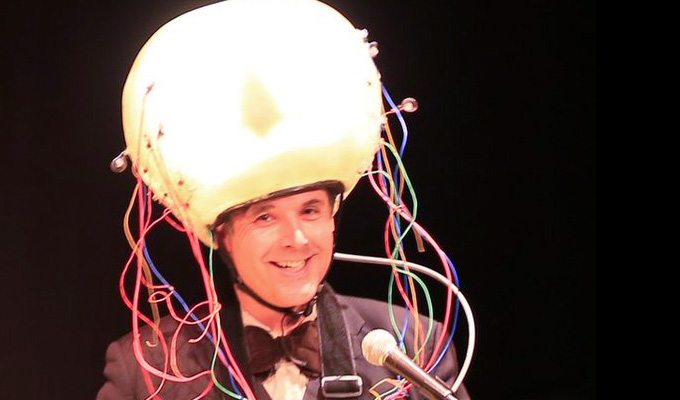
Neuropolis by Robert Newman
Book Review by Steve Bennett
Oh no! Not another arena-filling comedian with a quasi-academic tome about neuroscience. I’ve only just finished Lee Evans on hippocampal Cb2 receptor gene expression and Roy Chubby Brown on the lateral occipital sulcus.
Robert Newman has long adopted a more intellectual tone to his work, of course, taking full advantage of the position of interested layman gives him, as not being a professional scientist gives him an outsider’s eye to challenge orthodoxies.
In Neuropolis, which comes with an accompanying Radio 4 series, the comedian takes a dim view of the scientific community, which he sees as unduly pessimistic.
He takes particular umbrage with the idea, espoused by Brian Cox and others, that since the human brain is a network of physical and chemical systems obeying known laws of nature, it could, theoretically, be replicated by a sufficiently complex computer.
That sci-fi future seems an affront to Newman’s ideas of humanity – and indeed his political philosophy. If the sense of self is dehumanised by considering the mind simply a biological machine, it reduces people to passive citizens, more able to be manipulated and less keen to seek greater understanding of each other through a sense of community. He even blames neurological quackery from shifting the blame for the banking crisis on to the feckless poor and their gambling with debt because their reward centres compelled them to, rather than manipulative capitalism.
Newman’s objections are often more philosophical than scientific, rooted in his noble humanist ideas.His disdain for some aspects of science is fierce. At one point he writes: ‘We have got so used to solving mysteries that we are intolerant of the very concept of the unknown or unknowable… But sometimes there are just mysteries.’ Which very much sounds like a pre-Enlightenment cleric putting everything that confounds current understanding into a box marked ‘God’s Will: Do Not Open’.
Newman would probably not like the comparison, as he rails combatively against the fad for ‘magical scientism’ that he likens to a religion: the idea that these modern-day priests in lab coats have all the answers.
And indeed the best parts of his book are when he is casting doubt on dubious scientific processes, such as the suggestion that the lighting up of parts of the brain on an MRI scanner precisely relate to specific brain function, or the methodology of some psychological tests. One scientist, the amusingly named Dick Swaab, suggested the Japanese cannot tell fear from surprise, with no apparent evidence, while the notion that a smile evolved from an aborted snarl was put forward by VS Ramachandra despite a similar lack of proof.
 Of course, without doing a lot of background reading you’d have to trust Newman as much as he asks you to distrust some of the experimentalists, but he makes a credible argument. It’s something of a scattergun one, though, as he leaps around between various studies that get his goat, not always clear about charting a single narrative that links them all, save for the fact those nefarious scientists are up to something.
Of course, without doing a lot of background reading you’d have to trust Newman as much as he asks you to distrust some of the experimentalists, but he makes a credible argument. It’s something of a scattergun one, though, as he leaps around between various studies that get his goat, not always clear about charting a single narrative that links them all, save for the fact those nefarious scientists are up to something.
Given his background, Newman has put an amusing bent on his argument. In fact, sometimes it’s frustrating as he extrapolates real research findings into the comicallyfantastical, casting doubt over the whole lot. But his light approach makes the difficult subjects accessible.
That said, he also indulges in some intellectual grandstanding, relishing such scientific phrases as ‘dendritic arbourisation’ … then leaving it several pages to explain in simple terms what that means.
Still, it doesn’t take an MRI machine to show that Newman’s book provokes thoughts, even if you disagree with him – and even if he can be as infuriating as he can be enlightening.
• Neuropolis: A Brian Science Survival Guide was published last week by William Collins Books. Click here to buy.
Published: 4 May 2017






